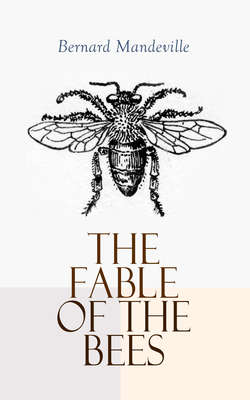Читать книгу The Fable of the Bees - Bernard Mandeville - Страница 10
На сайте Литреса книга снята с продажи.
ОглавлениеLine 55. These we call’d Knaves, but bar the name,
The grave industrious were the same.
This, I confess, is but a very indifferent compliment to all the trading part of the people. But if the word Knave may be understood in its full latitude, and comprehend every body that is not sincerely honest, and does to others what he would dislike to have done to himself, I do not question but I shall make good the charge. To pass by the innumerable artifices, by which buyers and sellers outwit one another, that are daily allowed of and practised among the fairest of dealers, show me the tradesmen that has always discovered the defects of his goods to those that cheapened them; nay, where will you find one that has not at one time or other industriously concealed them, to the detriment of the buyer? Where is the merchant that has never, against his conscience, extolled his wares beyond their worth, to make them go off the better.
Decio, a man of great figure, that had large commissions for sugar from several parts beyond sea, treats about a considerable parcel of that commodity with Alcander, an eminent West India merchant; both understood the market very well, but could not agree: Decio was a man of substance, and thought no body ought to buy cheaper than himself; Alcander was the same, and not wanting money, stood for his price. While they were driving their bargain at a tavern near the exchange, Alcander’s man brought his master a letter from the West Indies, that informed him of a much greater quantity of sugars coming for England than was expected. Alcander now wished for nothing more than to sell at Decio’s price, before the news was public; but being a cunning fox, that he might not seem too precipitant, nor yet lose his customer, he drops the discourse they were upon, and putting on a jovial humour, commends the agreeableness of the weather, from whence falling upon the delight he took in his gardens, invites Decio to go along with him to his country house, that was not above twelve miles from London. It was in the month of May, and, as it happened, upon a Saturday in the afternoon: Decio, who was a single man, and would have no business in town before Tuesday, accepts of the other’s civility, and away they go in Alcander’s coach. Decio was splendidly entertained that night and the day following; the Monday morning, to get himself an appetite, he goes to take the air upon a pad of Alcander’s, and coming back meets with a gentleman of his acquaintance, who tells him news was come the night before that the Barbadoes fleet was destroyed by a storm, and adds, that before he came out it had been confirmed at Lloyd’s coffee house, where it was thought sugars would rise 25 per cent, by change-time. Decio returns to his friend, and immediately resumes the discourse they had broke off at the tavern: Alcander, who thinking himself sure of his chap, did not design to have moved it till after dinner, was very glad to see himself so happily prevented; but how desirous soever he was to sell, the other was yet more eager to buy; yet both of them afraid of one another, for a considerable time counterfeited all the indifference imaginable; until at last, Decio fired with what he had heard, thought delays might prove dangerous, and throwing a guinea upon the table, struck the bargain at Alcander’s price. The next day they went to London; the news proved true, and Decio got five hundred pounds by his sugars, Alcander, whilst he had strove to over-reach the other, was paid in his own coin: yet all this is called fair dealing; but I am sure neither of them would have desired to be done by, as they did to each other.
